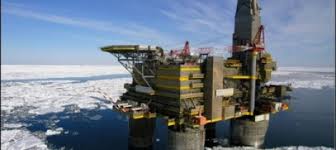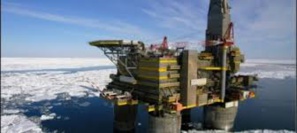An ironic hurdle has abruptly stopped a efforts by the US to set up a first oil drilling operation in US waters. The project has been stalled by a dearth of sea ice resulting from a rapid warming of the environment in the region.
The Liberty project below the Beaufort Sea, off Alaska’s north coast, which intended to extract oil and was approved by the Trump administration last month, has been affected by this environment change. This project would be the first of its kind to be implemented in federal waters in the Arctic and is part of the policy of Trump to reverse the ban on fossil fuel activity in the polar region imposed during the Obama administration.
But the challenge for the oil drilling company Hilcorp Energy for getting to the oil is the construction of a temporary gravel island about five miles offshore which would then allow the company to conduct drilling in shallow waters.
To create this island, the project requires the presence of about nine acres of landfast sea ice, which are essentially ice sheets that form every winter and get attached to the coast. This ice sheet would then form the base for the construction of the gravel island and then with concrete. But the company’s work has been stalled as it has found a shortage of shoreline ice. This has created uncertainty about the plans of extraction of up to 70,000 barrels of oil a day which would combine to a total of about 150m barrels over two decades.
According to the original forecast by Hilcorp, it would have required about a year to construct the island, but the problem of thinning sea ice has forced a revision of this plan, said a spokesman for the Bureau of Ocean Energy Management (BOEM).
“To safely transport gravel offshore in the Arctic, the ice along the route of the ice road must be of adequate thickness,” the spokesman told the media. “Over the last few years, that thickness has not developed until unusually late in the season.”
He said that another year has not been added by Hilcorp to the original forecast timeline to get the drilling island completed.
The temperature of the Arctic region is being warmed twice as quickly as other places on earth and the global average because of global warming accelerated by climate change due to burning of fossil fuels. Earlier this year, the Arctic region saw its warmest winter ever and there has been an unusual late freeze over of the Arctic Ocean according to reports from scientists and local communities.
“A number of studies have shown that landfast ice is forming later and breaking up earlier each year,” said Andy Mahoney, an assistant research professor in geophysics at the University of Alaska.
Projects such as the one undertaken by Hilcorp could face challenges because of the melting of permafrost and coastal erosion because of the shortening of the winter season because such projects have to rely on shoreline ice for drilling platforms.
But some environmentalists are very critical of allowing oil producers to drill in the Arctic Ocean region.
“Opening the Arctic to offshore oil drilling is a disaster waiting to happen,” said Kristen Monsell, ocean legal director with the Center for Biological Diversity. “This project sets us down a dangerous path of destroying the Arctic. An oil spill in the Arctic would be impossible to clean up and the region is already stressed by climate change.”
(Source:www.theguardian.com)
The Liberty project below the Beaufort Sea, off Alaska’s north coast, which intended to extract oil and was approved by the Trump administration last month, has been affected by this environment change. This project would be the first of its kind to be implemented in federal waters in the Arctic and is part of the policy of Trump to reverse the ban on fossil fuel activity in the polar region imposed during the Obama administration.
But the challenge for the oil drilling company Hilcorp Energy for getting to the oil is the construction of a temporary gravel island about five miles offshore which would then allow the company to conduct drilling in shallow waters.
To create this island, the project requires the presence of about nine acres of landfast sea ice, which are essentially ice sheets that form every winter and get attached to the coast. This ice sheet would then form the base for the construction of the gravel island and then with concrete. But the company’s work has been stalled as it has found a shortage of shoreline ice. This has created uncertainty about the plans of extraction of up to 70,000 barrels of oil a day which would combine to a total of about 150m barrels over two decades.
According to the original forecast by Hilcorp, it would have required about a year to construct the island, but the problem of thinning sea ice has forced a revision of this plan, said a spokesman for the Bureau of Ocean Energy Management (BOEM).
“To safely transport gravel offshore in the Arctic, the ice along the route of the ice road must be of adequate thickness,” the spokesman told the media. “Over the last few years, that thickness has not developed until unusually late in the season.”
He said that another year has not been added by Hilcorp to the original forecast timeline to get the drilling island completed.
The temperature of the Arctic region is being warmed twice as quickly as other places on earth and the global average because of global warming accelerated by climate change due to burning of fossil fuels. Earlier this year, the Arctic region saw its warmest winter ever and there has been an unusual late freeze over of the Arctic Ocean according to reports from scientists and local communities.
“A number of studies have shown that landfast ice is forming later and breaking up earlier each year,” said Andy Mahoney, an assistant research professor in geophysics at the University of Alaska.
Projects such as the one undertaken by Hilcorp could face challenges because of the melting of permafrost and coastal erosion because of the shortening of the winter season because such projects have to rely on shoreline ice for drilling platforms.
But some environmentalists are very critical of allowing oil producers to drill in the Arctic Ocean region.
“Opening the Arctic to offshore oil drilling is a disaster waiting to happen,” said Kristen Monsell, ocean legal director with the Center for Biological Diversity. “This project sets us down a dangerous path of destroying the Arctic. An oil spill in the Arctic would be impossible to clean up and the region is already stressed by climate change.”
(Source:www.theguardian.com)






